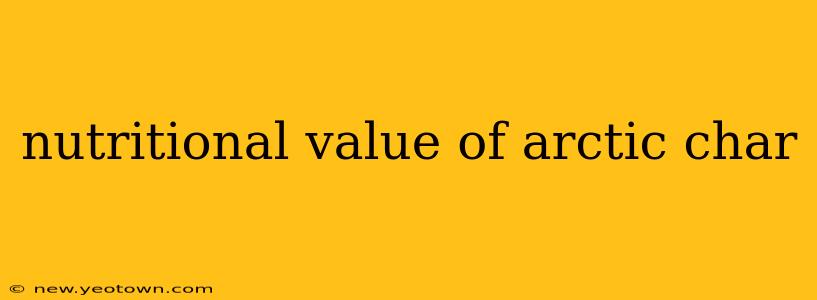The glistening silver scales, the delicate pink flesh—Arctic char isn't just a beautiful fish; it's a nutritional powerhouse packed with benefits for your health. Often overlooked in favor of more common salmon species, this cold-water inhabitant of the Arctic and subarctic regions offers a unique profile of nutrients that make it a truly exceptional choice for your diet. Let's embark on a journey to discover why Arctic char deserves a place on your plate.
What Makes Arctic Char So Nutritious?
Arctic char boasts a remarkable nutritional profile. Imagine a fish brimming with Omega-3 fatty acids, protein, vitamins, and minerals—that's Arctic char in a nutshell. Unlike many farmed fish, wild-caught Arctic char thrives in pristine, cold waters, resulting in a leaner, healthier fish with naturally vibrant hues. This pristine environment contributes to the superior quality of its nutritional content. But let's delve into the specifics:
Is Arctic Char High in Omega-3 Fatty Acids?
Yes! Arctic char is an excellent source of Omega-3 fatty acids, particularly EPA and DHA. These essential fats are crucial for brain health, heart health, and reducing inflammation throughout the body. Compared to some other salmonids, Arctic char often shows a higher ratio of EPA to DHA, making it a particularly beneficial choice for those seeking to enhance their cardiovascular health. Regular consumption of Omega-3s has been linked to a reduced risk of heart disease, stroke, and certain types of cancer.
What Vitamins and Minerals Does Arctic Char Contain?
Arctic char is a rich source of several essential vitamins and minerals. These include:
- Vitamin D: Crucial for bone health, immune function, and mood regulation. Arctic char is a particularly good source of this often-deficient vitamin.
- Vitamin B12: Essential for nerve function, red blood cell formation, and DNA synthesis.
- Selenium: A powerful antioxidant that protects cells from damage.
- Potassium: Important for maintaining healthy blood pressure.
- Phosphorus: Essential for bone health and energy production.
These nutrients work synergistically to support various bodily functions, contributing to overall well-being.
How Does the Nutritional Value of Arctic Char Compare to Salmon?
While both Arctic char and salmon are excellent sources of Omega-3s and protein, there are subtle differences. Arctic char tends to have a slightly lower fat content than some salmon species, making it a potentially leaner option. However, the specific nutritional composition can vary depending on factors like the fish's diet, age, and the environment where it's raised. Both are undeniably healthy choices, each with its own unique strengths.
Is Arctic Char Good for Weight Loss?
Because of its relatively lower fat content compared to some salmon species and its high protein content, Arctic char can be a valuable addition to a weight-loss diet. The protein keeps you feeling full and satisfied, reducing cravings and potentially aiding in weight management. However, remember that a balanced diet and regular exercise are crucial components of any successful weight-loss plan.
Where Can I Find Arctic Char?
Arctic char is increasingly available in specialty grocery stores, fish markets, and even some larger supermarket chains. Look for sustainably sourced options to ensure that your purchase supports responsible fishing practices. Many restaurants also feature Arctic char on their menus, providing a delicious way to experience its unique flavor and nutritional benefits.
Conclusion: A Delicious and Nutritious Choice
Arctic char deserves its place among the elite of healthy seafood options. Its remarkable nutritional profile, including its impressive Omega-3 content, essential vitamins, and minerals, makes it a delicious and nutritious addition to a balanced diet. So, the next time you're looking for a healthy and flavorful meal, remember the nutritional powerhouse that is Arctic char. Your body will thank you!

